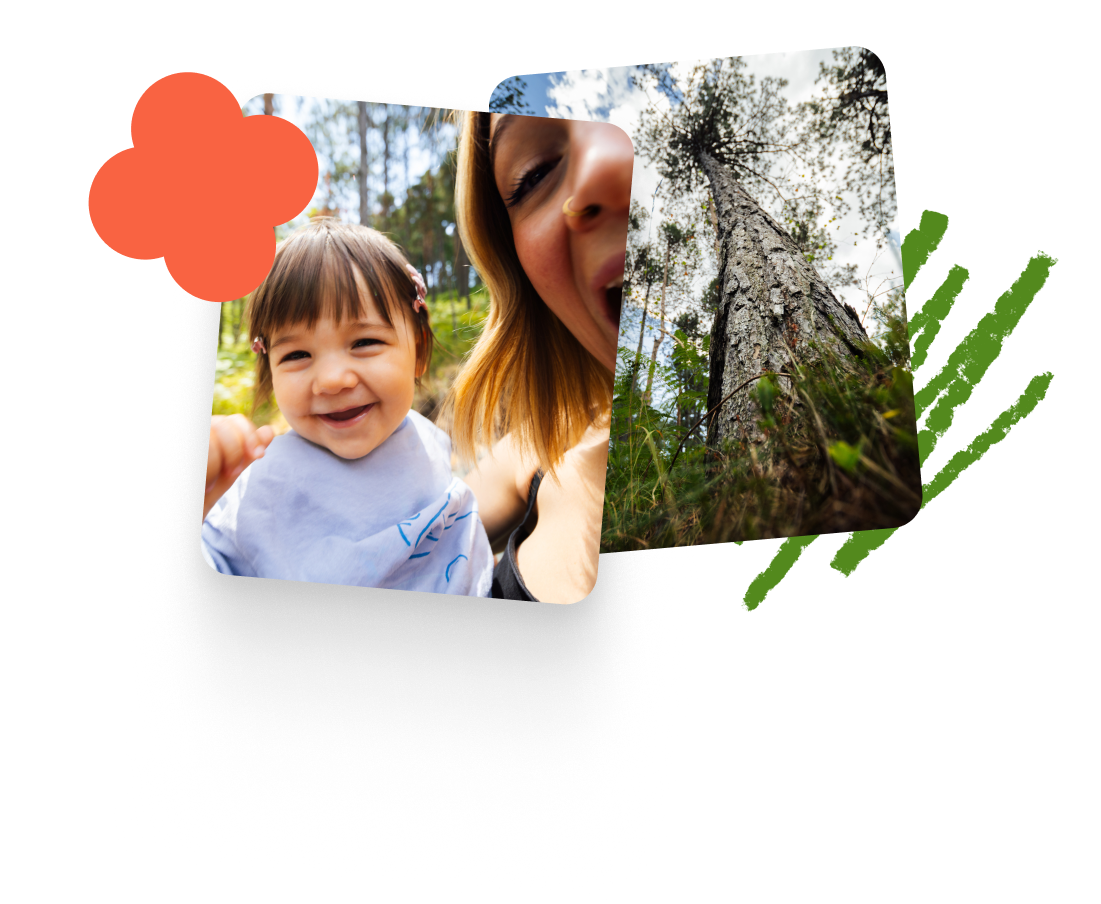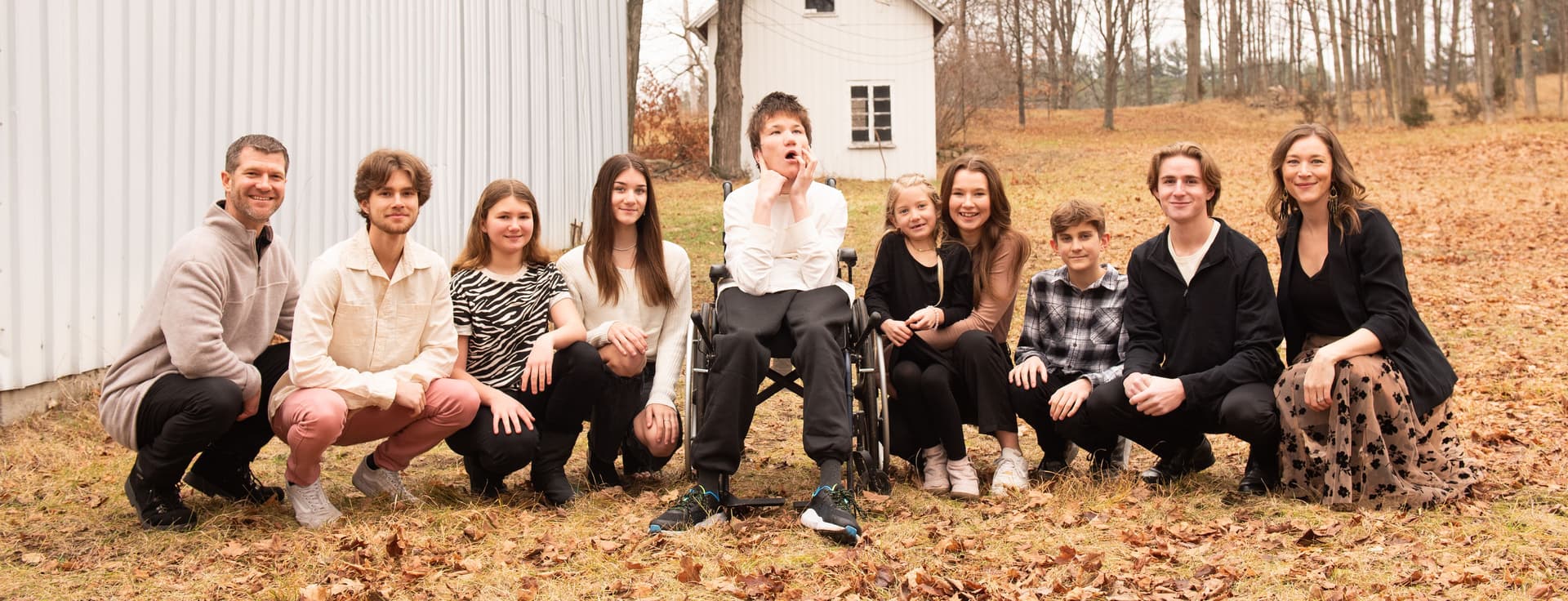
is now part of
Joy Parenting Club!
Families and care organisations using Heba will now have the option to also join Joy. For any questions, reach out to us at hello@heba.care

Families and care organisations using Heba will now have the option to also join Joy. For any questions, reach out to us at hello@heba.care

October 31, 2023
As National Family Caregivers Month kicks off, we catch up with the mother behind a documentary exposing the challenges faced by many parents caring for disabled or medically complex children and adults.
For Jessica Ronne, business as usual means rising before the sun. And as a mother of eight children – including 19-year-old Lucas, whose profound disability stems from a stroke in utero – it’s little wonder that this author, podcast host, not-for-profit founder and advocate needs to squeeze as much juice as she can out of her days.
At 5.30am, the Michigan local gets up and spends some early hours on whatever project she’s working on which, when we speak, is her fourth book. She’s come a long way since her debut title, a memoir called_Sunlight Burning at Midnight_ , in which she tells the heartbreaking story of losing her first husband, Jason, to brain cancer.
In an extraordinary plot twist, the then-33-year-old widower and sole parent of four young children – one with significant support needs – leaned into her faith and found herself landing in a big, blended family. In 2011, Jess married Ryan Ronne, a father of three who also lost his first spouse to brain cancer. The pair had a daughter together in 2015, bringing their family tally to ten.
The Ronnes relocated to rural Tennessee where they lived on 30 sprawling acres and enjoyed the simplicity and slower pace of country life. That is until 2017, when Lucas hit puberty and his behaviours and aggression intensified. Struggling to find support, Jess started The Lucas Project, an organisation providing resources and respite for families raising children with disability.
Jess also launched a podcast, Coffee with Caregivers, where she chats with fellow parent carers and, in 2022, the Ronnes co-created and starred in the documentary Unseen: How We’re Failing Caregivers & Why It Matters. Here, the couple share the dire impact a lack of support for Lucas had on their family, highlighting the urgent need for more awareness around this cohort.

Thankfully, as the following conversation brings to light, life now looks very different for Jess, Ryan and their children. Moved back to their native Michigan, the family has built a village of support around Lucas, laying the foundations for a bright and hopeful future.
Here, Jess takes us from a period she describes as “the end of her rope” to where she’s at now.
Do you remember when you started to identify as a carer?
That only happened a couple of years ago. It didn’t even happen for me when we were producing the documentary, because I kept pushing for “special needs”. Like, we’re a “special needs family”. The producer kept pushing for a “parent caregiver” language, and that language felt really foreign to me. I didn’t resonate with “parent caregiver”.
Then a shift occurred – I think when Luke was around 17 or 18 – when I started to view him as a grown man. And I’m still bathing him, I’m still dressing him, I’m still feeding him. That’s when the shift became very apparent to me. I am his mum, but I’m also his caregiver.
It also became very apparent to me that I don’t know that I want to do this for the rest of my life – being his primary caregiver – and I don’t know that he wants his mother to do this for the rest of his life. So what am I going to do to make this shift occur where we can get some other caregivers in place to do the caregiving roles, and I can just be mum and he can just be my son? This is the transitional stage we’re in right now.
It sounds like you are in a different place to where you were a couple of years ago while making your documentary, Unseen _ . What was going on at this time?
We were at the end of our rope. It was the middle of the pandemic, Luke was home, he was screaming… I mean, you hear the screaming in_Unseen . My husband had ended up in the ER numerous times with panic attacks that resembled heart attacks. He had a PET [positron emission tomography] scan where they were looking for cancer. We were holed up, isolated with eight kids who weren’t in school. Our house became a tomb. We were at the lowest that we could possibly be.
When we watch the documentary, my husband and I often have to leave the room when the screaming and the banging comes on the screen. People like to put us front and centre in the auditoriums and we’re like, “We’re going to sit all the way in the back” because when those moments come on, it’s just like reliving it all over again and my heart starts racing. There’s PTSD [post-traumatic stress disorder]. I’m right back in fight or flight mode. It was a really difficult period of life for all of us.
While it’s hard for you to watch, are you glad that the documentary captures and shares this point in your family’s life?
Oh I’m glad it still exists. I mean, we still deal with moments and behaviours like that occasionally. Medication has made a huge difference for Lucas, but he’s 19 years old, he’s got a lot of testosterone and he’s non-verbal and he likes to make his desires known. I think the documentary needs to exist in that capacity because there are so many families who are drowning just like ours was.
It’s a fine line portraying the reality and maintaining some sort of dignity for your loved one, because we’re never going to get the help or the resources we need if we don’t show our reality. I think that the producer and the filmmaker did an incredible job figuring out where that line was, and I think it's done what we set out to do and that’s to bring recognition to caregiving families.

When did things start to turn around for your family?
Well, we moved again. And in Michigan we have this thing called a psychosocial evaluation. It sounds awful, but you basically paint the worst-case scenario for your child [to vouch for funding, services and supports]. Tennessee didn’t have anything. It’s very much state by state here, and special needs families typically know the good states and the bad states to avoid.
Unfortunately, the bad states are almost always the sunny states where they have good weather. And the good states are the ones where it's freezing cold and you have snow for six months. So that’s where we are – but we have services and support.
So yeah, we moved back to Michigan and we just thought, at least we have friends and family here who will support us even if the government falls through again. Which you’re just sort of used to. People just don't come through for you. But it’s been incredible.
Since Lucas turned 18, I now get a paycheque as his caregiver and we get state funding to hire 20 hours a week of care for him. We can choose these people and they’re paid a very good wage, we get respite dollars, and we’re creating a residential home for Lucas as well – a partnership which our county has been instrumental in helping to make work.
All the connections and balls and moving parts that go into creating a facility like that – it's a lot – but we have a plan in place. Lucas will be living there by 2024, with full-time care with three other residents.
That sounds incredible. What does this partnership look like and how did you connect with Lucas’ future housemates?
We started out just thinking it was going to kind of be our thing. We purchased this home and I made the mistake of advertising to the whole world, ‘Hey, we have this home and if you want a space, contact me!’ I had like 200 inquiries. I’m not a details person so I just dived in and then I was like, well, that was dumb.
So we pulled back big time and we got really serious about meeting families. We have three other families that we’ve partnered with. Everybody has a profoundly disabled child, they’re all young adults and they all know each other and go to school together. We didn't go into this searching for community, but these other families are now our best friends because we're all in this together. We're going to do life together and we’re going to show up.
We’ve partnered with a care agency to provide the care. If for some reason this care falls through, each family takes one week a month to be the emergency backup plan for the house. So for at least three weeks out of the month, you can just breathe and live your life, knowing that your child is well cared for.
I would say to anybody who's looking to create something similar, find those families that will do this with you because there is power in numbers. We've moved forward as a team and tackled every single problem that we've come up against. There has been power there and we’ve just sort of barged through and gotten what we've needed, and it’s just been incredible to be a part of.
On the topic of advice – and in the spirit of National Family Caregivers Month – what words of comfort do you have for new parent caregivers?
First, don't look too far into the future. Try to stay present, moment by moment, and enjoy your child. I think we can get so caught up as caregivers obsessing about so many things in the future that we lose sight of the here and now.
However then I would say, almost in complete contrast to that, do start to think about the future in terms of, do you want to care for your child for the rest of your life? Would you prefer some sort of home? Because I can tell you, I blinked and Lucas turned 19. When he was a little boy I swore up and down to anybody who would listen that he would never live anywhere outside of my home and with my care.
Then he went through puberty and he became very aggressive and some of his behaviours became very, very difficult. And I had to give myself grace to say, maybe that’s not the best-case scenario for all of us, for the rest of our lives. And a yes to being Lucas's primary caregiver for the rest of his life is a no to so many other aspects of my life, including his siblings, my marriage, me, and my future grandchildren.
And then finally, I would just say, the “Martyr Mummy” syndrome is alive and well. You are no good to anybody if you’re dead, so release some of that care, if at all possible.
I’m now 46 and sort of in this weird perimenopausal state of being and recognising my body’s limitations. I’ve had to be gentler with myself. I have eight kids and if I don’t take care of myself, the whole ship is going to sink. I’m no good to anybody dead, so I have to take care of myself.
You can follow Jessica’s story and work on her website, Instagram and Facebook accounts. Find out about the Unseen documentary here.
Let’s clear out the complexities of care. Try Heba for free here.
Want to share your parent-carer story? We’d love to hear it. Get in touch with our team at hello@heba.care